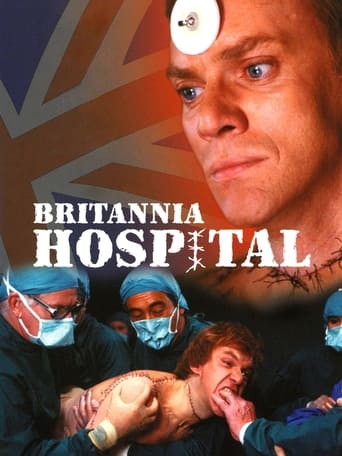Kieran Wright
I really wanted to like this movie, but in the end couldn't even bear to watch it to the end. The one redeeming feature was Leonard Rossiter and I found myself wondering whether even he would have doubted his sanity in signing up to this when he saw the final rushes. Malcolm McDowell, whom I considered to be a good actor, was reduced to little more than a 'Carry-On' performance. The juxtaposition of farce and horror to me seemed miscalculated. Just dreadful and one I'm trying to forget... Tip: don't watch this whilst consuming food.
andrew-lamb-542-716618
I guess there are a lot of Lyndsay Anderson fans out there who are prepared to forgive their hero. Although, why they should forgive him for dropping the ball with this turkey I can't imagine. Personally, I thought this slice of "satire" was a dreadful crock of brown, smelly stuff. Coming on the heels of "O Lucky Man" I was fully in tune with all the surreality. Sadly the thing was painfully let down by all those bolt-on, tokenistic and grand-standing waves to the liberal gallery. I thought the scene where the pretty little protester offered the riot cop a flower was particularly risible. The implication being that the rioters were all a bunch of peace-niks and definitely not inclined to get down and medieval with the fuzz. As for Mick Travis' snogging scene with the nurse, well....... I've never seen a less convincing affair-de-coeur, Carry-on films included.Now, that would be an idea for a subtle satire: "Carry On Anderson"
ShadeGrenade
'If....' and 'O Lucky Man' were the extremely compelling first two instalments of the 'Mick Travis' trilogy, directed by Lindsay Anderson, and starring Malcolm McDowell as the eponymous hero. What might be loosely described as 'the final chapter' - 'Britannia Hospital' - lags behind in terms of power and pace.It is set in the hospital of the title, where staff are striking ( the patients have to eat oranges ) and refuse to let ambulances through the main gates ( unless the patients are near-death ). Protesters object to an Amin-like leader who is being treated there as a private patient. Vincent Potter ( Leonard Rossiter ) is the manager trying against all odds to organise a visit from The Queen Mother. He even bribes the shop steward with a promise of an O.B.E.! Mick Travis, newly returned from the States, is part of a television crew making a documentary about the strange goings-on at The Millar Centre. Mad-as-a-March-Hare Professor Millar ( Graham Crowden, reprising his role from 'O Lucky Man' ) is conducting Frankenstein-style medical experiments.With the Winter of Discontent ( an industrial dispute that affected the entire country for several weeks in early 1979 ) still fresh in people's memories, David Sherwin's script has a lot to say on the so-called decline of Britain. The trouble is we have heard it all before. The Boulting Brothers' 'I'm All Right Jack' also made fun of trade unions, while Robin Askwith's ( how shocking must it have been then to see him in a movie where he kept his clothes on ) militant shop steward is not far removed from the Kenneth Cope character in 'Carry On At Your Convenience' ( 1971 )Leonard Rossiter amuses as the harassed 'Potter', and Anderson's stamp is on it, but for me this is an unfortunate end to the 'Mick Travis' series. McDowell gets little to do other than prowl around hospital corridors with a mini-camera in his hand. The character looks as though he was put in as an after-thought. He deserved a much better send-off than this.Arthur Lowe is seen briefly as a rich patient who makes a stirring patriotic speech before expiring ( the actor sadly passed away for real soon afterwards ), and Alan Bates contributes a cameo ( if you can call it that ) as a corpse. Mark Hamill ( yes, old 'Luke Skywalker' himself ) plays a pot-smoking member of Travis' television team.Like 'If....', the film ends in violent fashion as the protesters and the strikers smash through the gates and invade the hospital. It had the misfortune to open in Britain around the time of the Falklands War, when the prevailing national mood was one of machismo and jingoism, and right-wing papers had a field day stirring up outrage over Anderson's so-called unpatriotic depiction of Royalty. Anderson never worked in Britain again, a fate reminiscent of that of the great Michael Powell. Not a bad film as such, but its statements are unoriginal and humour far too obscure to be really funny.
sol-
After satirising Britain's education system in 'If....' and the British justice system in 'O Lucky Man!', Lindsay Anderson takes a look at the health care system in this final part of his trilogy with Malcolm McDowell. It is not as effectively dramatic as 'If....', nor is it as delightfully whimsical as 'O Lucky Man!', but even if slightly inferior, this is a good film in itself, full of fascinating ideas and colourful characters. It is quite interesting to watch throughout, although a bit excessively disgusting and over-the-top at times, and in general it is a fairly solid conclusion to perhaps the oddest trilogy that has ever been filmed.





